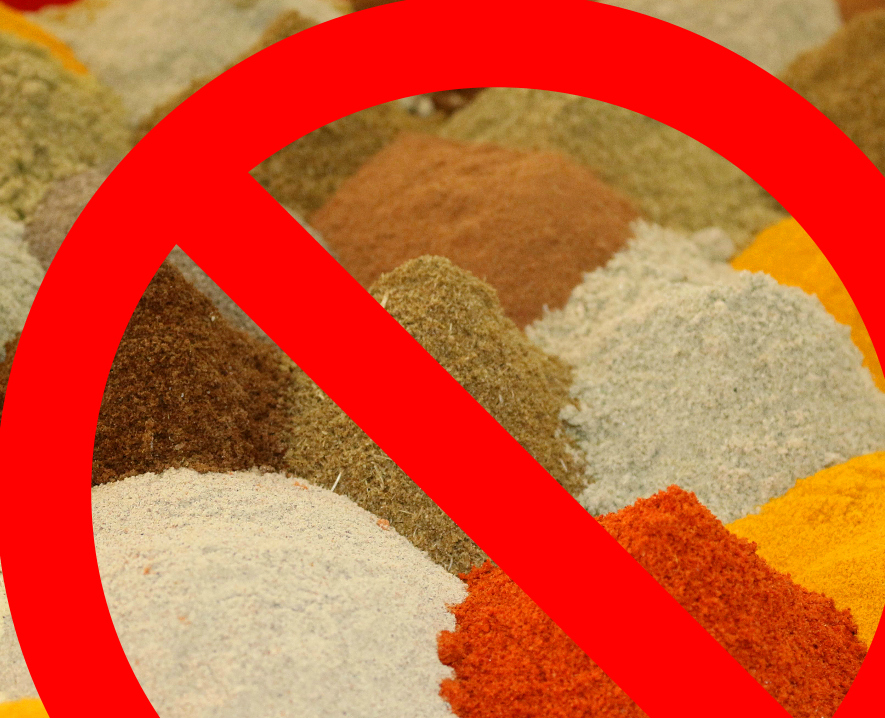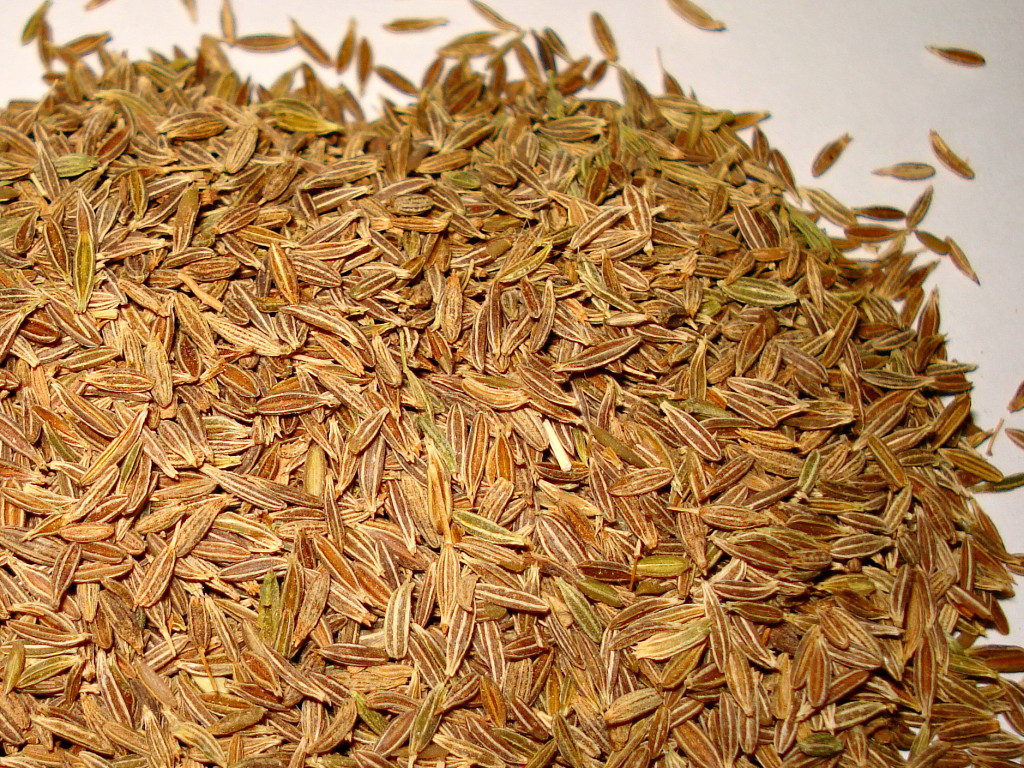 After months of recalls of cumin, spice mixes that contain cumin, and hundreds of thousands of pounds of packaged foods that contain cumin due to the presence of undeclared peanut and tree nut ingredients, on February 18th, the U.S. Food and Drug Administration finally issued a public advisory statement warning people with peanut allergies “to consider avoiding products that contain ground cumin or cumin powder.”
After months of recalls of cumin, spice mixes that contain cumin, and hundreds of thousands of pounds of packaged foods that contain cumin due to the presence of undeclared peanut and tree nut ingredients, on February 18th, the U.S. Food and Drug Administration finally issued a public advisory statement warning people with peanut allergies “to consider avoiding products that contain ground cumin or cumin powder.”
The advisory goes on to say:
The FDA is continuing to identify companies that received shipments of the ground cumin that contained undeclared peanuts and work with them to remove these products from the market. While this investigation is underway, the FDA wants consumers who are highly allergic or sensitive to peanuts to consider taking precautions with any product [emphasis mine]—not just those that have been recalled—that contains ground cumin. The FDA will continue to update the list of recalled products.
So basically: multiple shipments of ground cumin recently imported into the United States (and, I should note, other countries, including Canada and the UK) have been found to contain undeclared peanut protein. The FDA does not know how many U.S. spice companies may have received shipments of peanut-contaminated cumin; the FDA does not know for certain which overseas spice suppliers may be contributing to this problem; the FDA does not know how many food products the contaminated cumin may already have been added to; the FDA does not know which future shipments of ground cumin may also be contaminated; the FDA is working on it.
And in the meantime, if peanuts happen to be a thing that can kill you in small doses, the FDA is gently advising you to “consider” avoiding all ground cumin, all spice mixes that contain ground cumin, all packaged foods that contain ground cumin, and all packaged foods that contain unspecified “spices” that may or may not include ground cumin.
So.
How do you do that?
I’ve been trying to help my peanut allergic son avoid cumin in his diet for a few months now, ever since I first got an inkling of the magnitude of this recall situation, and let me tell you: it’s not easy. Here are some tips:
Go beyond reading food labels.
This is really important: According to U.S. food labeling law, cumin is not considered one of the top 8 food allergens. That means that FDA and USDA labeling regulations do not require that cumin be labeled under the same “plain language” labeling rules as ingredients derived from milk, eggs, wheat, peanuts, tree nuts, shellfish, fish or soy. The official guidance the FDA offers food makers on labeling their products for spices is:
How are spices, natural flavors or artificial flavors declared in ingredient lists?
Answer: These may be declared in ingredient lists by using either specific common or usual names or by using the declarations “spices,” “flavor” or “natural flavor,” or “artificial flavor.”
“INGREDIENTS: Apple Slices, Water, Cane Syrup, Corn Syrup, Modified Corn Starch, Spices, Salt, Natural Flavor and Artificial Flavor”
However, products that are spices or spice blends, flavors or colors must list each ingredient by name.
So if you are looking at any packaged food that is not actually container of spice or spice mix, know that the ingredient label does not have to list cumin even if cumin is an ingredient. Cumin could be listed as “spice,” “spices,” “flavor,” or “natural flavor.” Even a food label that declares some spices by name in the ingredient list may not declare all of the spices by name. For example, a food label for sausage might read, “Pork, salt, black pepper, spices,” or “Chicken, salt, oregano, natural flavors.” Either of those items might contain cumin, even though they do not explicitly say so on the label.
This is perfectly legal. Food companies in the U.S. are just flat out not legally required to specifically list spices or flavorings on ingredient labels, or be consistent about how they do list specific spices and flavorings when they do bother to list them. (Yes, this can and does cause major problems for people with food allergies to spices or flavorings, and I if I listen hard, think I can hear a chorus of non-top-8 food allergy sufferers right now, shouting, “Welcome to our world, people with peanut allergies!”)
This means if you are currently avoiding cumin due to peanut contamination risk, you are going to need to call or email companies that make packaged foods that are likely to contain cumin and ask them whether their products contain cumin. There is no easy way around this. There is no magical list of U.S. products that contain / do not contain cumin. To stay away from cumin for the duration of this recall, you are going to have to do some serious food ingredient research homework.
What foods are likely to contain cumin? If you don’t know, it’s time to find out.
If you don’t cook with cumin often in your own kitchen, you may not be that familiar with which foods are most likely to contain it. Cumin is considered a warm, earthy, peppery spice, often used to flavor foods that are thought of as “hot” or “spicy.” Here are a few to watch out for:
Spice mixes: BBQ rubs, chili flavoring, curry spice mixes, spicy stir fry mixes, sausage spice mixes, and spices labeled as Mexican, Cajun, Middle Eastern, Indian or Chinese spice mixes often contain cumin.
Spicy sauces: Cumin is a common ingredient in barbecue sauce, curry sauce and many stir fry sauces.
Salsa: Cumin is commonly used in Mexican-style cooking and is sometimes used to flavor salsa.
Meats: Spicy packaged meats such as sausages or pre-seasoned, barbecue-style pork and beef cuts are likely to contain cumin– thousands of pounds of these types of items have already been recalled for undeclared peanut due to the use of contaminated cumin.
Chili: Just as cumin is a common ingredient in chili spice mixes, cumin is an ingredient in many commercial chili recipes. Several chili products have already been involved in this set of recalls.
Seasoned black beans or black bean soup: Cumin is a common seasoning for spicy dishes that contain black beans. Two Goya products that contain black beans have already been recalled for undeclared peanut due to contaminated cumin.
Veggie burgers: Any sort of “spicy black bean” or “southwestern style” veggie burgers are likely to contain cumin; Morningstar Farms has already recalled some lots of black bean veggie burgers for undeclared peanut due to the use of contaminated cumin.
Hummus: Cumin is commonly used to flavor hummus.
Any BBQ flavored anything: Since barbecue rubs, sauces and spice mixes often contain cumin, any food that advertises itself as barbecue-flavored needs to be on your check-twice list.
Any spicy food that advertises Southwestern, Mexican, Cajun, Middle Eastern or Indian flavor: cumin is a signature spice ingredient in all of these regional cuisines.
Foods that are not likely to contain cumin include fresh whole produce, unflavored meats, plain breads and pastas, unflavored rice, unflavored beans etc. For the duration of the recall, if you are craving spicy foods that ordinarily contain cumin, it’s probably best to skip the store-bought pre-packaged options and make your spicy dishes yourself, with simple whole ingredients and spices you have checked on and trust.
Don’t forget about restaurants.
The FDA alert on peanuts in cumin says nothing specific about avoiding restaurant food– but that’s because the FDA does not actually regulate food safety in restaurants; that’s handled by a patchwork of local health departments and agencies, and the USDA. The USDA website currently redirects people with queries about the cumin recalls to the FDA advisory statement, which is not super helpful if you’re trying to get safety advice about food that is not regulated by the FDA.
But I would say it’s safe to assume that many restaurants may be serving up contaminated cumin at the moment– and they may not even know it. Literally hundreds of thousands of pounds of food, spices and spice mixes from dozens of different companies have been recalled for undeclared peanut since November 2014, so it would be easy for even a diligent restaurant chef to miss an item on the list. Besides, according to the FDA, the investigation into this problem is still underway, so it is entirely possible that multiple brands of spice products, meats, sauces, and other food items that contain contaminated cumin have yet to be recalled and are still being sold to restaurants as well as consumers.
Since cumin allergies are not common, restaurant servers and chefs may not be accustomed to requests from customers to avoid cumin in dishes, and given the U.S. food labeling law loopholes mentioned above, restaurant staff may honestly not even know which of their dishes contain cumin.
For anyone with a peanut allergy, I would recommend exercising extreme caution eating at restaurants at this time– even when eating out at restaurants with a good reputation for being food allergy friendly.
So is any cumin safe for people with peanut allergies to eat right now? Do we really really have to avoid all of it?
So here’s the honest truth: all those foods I listed above that are likely to contain cumin? Like, you know, BBQ sauce, black bean veggie burgers, hummus, burritos, enchiladas, chana masala?
I LOVE THOSE FOODS. I LOVE THEM. I love cumin!
NOT MORE THAN I LOVE MY AMAZING, KIND BRILLIANT HANDSOME GENEROUS CREATIVE FUNNY AND WONDERFUL FIRSTBORN AND ONLY CHILD, of course. So I’d happily give cumin up, just as I’ve given up peanuts (and peanut butter and granola bars and M&Ms and Reese’s Peanut Butter cups and most kinds of chocolate actually and Pad Thai). If I had to ban peanut entirely from my home to keep my kid safe? I would do that. NO QUESTION.
But is there a way for me to get safe, peanut-free cumin to make safe versions of cumin-heavy dishes from scratch? Luckily, there do seem to be a few safe options for cumin-lovers who need to avoid peanut. Here are some tips for tracking down peanut-free cumin to use at home:
Whole cumin is safer than ground cumin: So far, all of the peanut-contaminated cumin found in the U.S., UK and Canada has been ground cumin. There is probably a reason for this: ground cumin looks very similar to peanut flour and / or ground peanut shells. So if, say, a cumin supplier suffering from a cumin shortage caused by a particularly bad cumin harvest in India this season did, say, want to, shall we say, stretch cumin shipments by illegally adding in a similarly colored, cheaper filler, adding peanut flour or ground peanut shells to ground cumin would be the way to go. It would be much harder to hide fillers like peanut shells or peanut flour in whole cumin seed, which looks like this:

You can look for recipes that use whole cumin seeds instead of ground cumin, or buy whole cumin and then grind it yourself at home with a spice grinder or a mortar and pestle.
Some spice brands are safer than others: Spice maker McCormick, well known in food allergy circles already for having a peanut-free processing facility, has issued a public statement to reassure their customers that none of their cumin-containing products, have been involved in any of the recent cumin recalls; McCormick states that they source their cumin as whole seeds, clean it to remove impurities, and then grind it in their own peanut-free facilities.
Have any other single-ingredient spices been involved in recalls for undeclared allergens lately?
Yes. A couple of brands of paprika were recently recalled in the U.S. for undeclared peanut and in the UK for undeclared almond. I do not know whether this is a separate, isolated incident, or is directly connected to the cumin recalls. The FDA has yet to issue any sort of general warning about paprika as they have about cumin, but more paprika recalls are definitely something to keep an eye on over the next few weeks.
What about people who are allergic to tree nuts, but not peanuts? Do they still need to avoid cumin?
Honestly I do not know why the FDA failed to include a warning to people with tree nut allergies in this advisory statement. While most of the recent cumin recalls have involved undeclared peanut, it is absolutely the case that a few of the recalls of cumin / products that contain cumin– including recalls for Ortega taco spice and Cool Runnings curry seasonings— also involved undeclared almonds. And as mentioned above, one of the recent paprika recalls was related to undeclared almonds. If you have an allergy to almonds or other tree nuts, then you should absolutely be paying close attention to this spice recall situation, too.
 Did you know that undeclared food allergens are a leading cause of food recalls in the United States? According to the U.S. Food and Drug Administration (FDA), from September 2009 to September 2012, about one-third of reports to the agency for serious food safety violations involved top 8 food allergens that were not properly listed on food labels.
Did you know that undeclared food allergens are a leading cause of food recalls in the United States? According to the U.S. Food and Drug Administration (FDA), from September 2009 to September 2012, about one-third of reports to the agency for serious food safety violations involved top 8 food allergens that were not properly listed on food labels.




